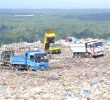
DAVAO CITY, Philippines – A non-governmental group will conduct a survey to gauge the level of public awareness on environment-related local policies and programs.
Dubbed as EcoPol or Ecological Policies Survey, Interfacing Development Interventions for Sustainability (IDIS), Inc. launched a city-wide social survey that aims to assess the level of awareness, attitude in terms of satisfaction of the citizens, and their practices to the existing local environments laws and executive orders.
“Through this research, we will be able to identify what local ecological ordinances and executive orders are common and uncommon to Dabawenyos. The result and recommendations of this research will be forwarded to concerned offices to fill the gaps and strengthen its IEC campaign regarding those policies,” Justin Joshua Pungyan, IDIS Environmental Research Officer, said.
IDIS targets to secure 110 respondents for the house-to-house survey using the Kobo Toolbox, a paperless data collection system. They will be interviewing 10 respondents in each administrative district of Poblacion, Talomo, Agdao, Buhangin, Bunawan, Paquibato, Baguio, Calinan, Marilog, Toril, and Tugbok. While the additional one hundred (100) respondents will be through an online survey using a Google Forms link deployed on the IDIS’s social media page.
The survey will tackle the public knowledge on policies such as the city’s No Smoking Ordinance, Rainwater Harvesting Ordinance, No to Single Use Plastics (SUP) Ordinance, Ecological Solid Waste Management Ordinance, Ordinance Prohibiting the Release of Flying Balloons and Lighted Sky Lanterns, the Watershed Code, Ordinance regulating trekking activities and other recreational activities within the Watershed Areas, the Amended Bicycle Ordinance, Lead-Safe Ordinance, the Dabaw Lunhaw Awards, and the Ordinance on Organic Agriculture.
Ms. Yvette Balayon-Mahinay, Knowledge Management Officer of IDIS noted that in areas like the rural communities in district three, residents are more likely to be familiar with local policies within their interests like agriculture.
“But they do not know about other ordinances like the Watershed code, they do not know about that. So, there is a difference nga magmatter gyud ang ordinance kung unsa ang duol sa heart sa pumuluyo dira nga district.” Balayon-Mahinay said.
IDIS stressed that despite the city’s initiative through legislation to address concerns on environmental protection most of these ordinances have not been disseminated, implemented, or known by the public.
In fact, Balayon-Mahinay said some of the city’s policies have already overlapped with the existing national law but lack the push for implementation and monitoring in the community.
‘Sometimes ang ubang ordinances nato naga overlap napud sya sa mga ordinances nato in national. We have this ecological solid waste ordinance daan sa national but kita sa davao naa gihapon tay No to Single Use Plastic (SUP) Ordinance supposed to be under na sya didto pero ang DENR wala gihapon sila nagawas og mga non-acceptable nga mga packaging products so we opted to lobby that ordinance on No to SUP,” she said.
Out of the nine environmental policies mentioned in the survey, the SUP and the Bicycle Ordinance of Davao City still do not have Implementing Rules and Regulations (IRR) after it was passed by the city council during the pandemic period.
Balayon-Mahinay said without the IRR, the public continue their harmful practices without having any idea about the prohibitions and penalties. (davaotoday.com)
davao city, environment, IDIS









